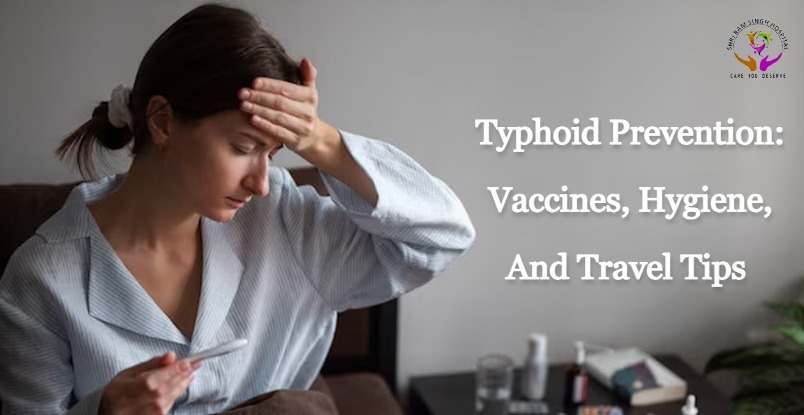Typhoid is a serious bacterial infection that can be prevented with the right knowledge and precautions. In this guide, we’ll explore the key strategies for typhoid prevention, including vaccines, hygiene practices, and essential travel tips.
The Importance of Typhoid Vaccines
When it comes to preventing typhoid, vaccination is your first line of defense. The most common vaccines available are the oral live-attenuated Ty21a and the injectable Vi capsular polysaccharide vaccines.
Who Should Get Vaccinated?
Vaccination is recommended for individuals traveling to regions where typhoid is prevalent, especially in parts of Asia, Africa, and Latin America. It’s also crucial for those who work in healthcare or food-handling industries.
Vaccine Effectiveness
Studies have shown that typhoid vaccines can provide significant protection against the disease, reducing the risk of infection by up to 70-90%.
Hygiene Practices to Prevent Typhoid
Safe Food Handling
Proper food preparation and handling are paramount in preventing typhoid. Wash hands thoroughly, cook food to recommended temperatures, and avoid consuming raw or undercooked items.
Water Safety
Contaminated water is a primary source of typhoid transmission. Ensure you drink only from trusted, purified sources. If in doubt, opt for bottled or boiled water.
Personal Hygiene
Maintain good personal hygiene by regularly washing your hands with soap and clean water. This simple practice can go a long way in preventing typhoid transmission.
Travel Tips for Typhoid Prevention
Research Your Destination
Before traveling, familiarize yourself with the prevalence of typhoid in your destination. This information will help you tailor your preventive measures accordingly.
Get Vaccinated in Advance
Schedule your typhoid vaccination well in advance of your departure date. Keep in mind that some vaccines may require multiple doses for full effectiveness.
Pack a Travel Health Kit
Include items such as hand sanitizers, water purification tablets, and any necessary prescription medications to ensure you’re prepared for any situation.
Read This Also: Why You Need to Choose the Best Multispecialty Hospital for the Treatment
Conclusion
Preventing typhoid is within your reach with the right knowledge and precautions. By getting vaccinated, practicing good hygiene, and following essential travel tips, you can significantly reduce your risk of contracting this potentially serious disease. Contact us for instant treatment and other healthcare services. Visit Shri Ram Singh Hospital Noida Sector – 71.
Remember, an ounce of prevention is worth a pound of cure. Stay informed, stay protected!
FAQs:
How Can We Prevent Typhoid When Traveling?
Answer: Preventing typhoid while traveling involves a multi-faceted approach. It includes getting vaccinated, practicing good hand hygiene, avoiding consumption of raw or undercooked food, and drinking only safe, treated water. Additionally, it’s advisable to stay in accommodations with proper sanitation facilities.
How Long Before You Can Travel With Typhoid Vaccine?
Answer: It is recommended to get the typhoid vaccine at least two weeks before traveling. This allows sufficient time for the vaccine to provide adequate protection against the infection.
Should Typhoid Vaccine Be Given a Day Before Travel?
Answer: Ideally, the typhoid vaccine should be administered at least two weeks before travel to ensure maximum effectiveness. However, if there is limited time, getting the vaccine a day before travel is better than not getting vaccinated at all.
What Is The Hygiene For Typhoid Fever?
Answer: Maintaining good hygiene is crucial in preventing typhoid fever. This includes frequent handwashing with soap and clean water, especially before handling food. Avoiding consumption of raw or undercooked food, and drinking only treated or bottled water are also essential practices.
Why Take Typhoid Vaccine On Empty Stomach?
Answer: Taking the typhoid vaccine on an empty stomach helps improve its absorption in the digestive system, leading to better effectiveness. It is generally recommended to avoid eating or drinking anything (except water) for about an hour before and after receiving the vaccine.
What To Avoid After Typhoid Vaccine?
Answer: After receiving the typhoid vaccine, it’s advisable to avoid consuming alcohol, spicy foods, and large meals for a few hours. Additionally, it’s recommended to refrain from vigorous physical activity or strenuous exercise on the day of vaccination.
What Happens If You Forget To Refrigerate Typhoid Vaccine?
Answer: It is crucial to store the typhoid vaccine at the recommended temperature. If the vaccine is not stored in the refrigerator and is exposed to higher temperatures, it may lose its effectiveness. In such cases, consult a healthcare professional for advice on whether a replacement dose is necessary.
Can Typhoid Be Spread Through Casual Contact?
Answer: Typhoid is primarily spread through ingestion of contaminated food or water. Casual contact, like hugging or shaking hands, is not a common mode of transmission. However, close contact with an infected person can pose a risk, especially if proper hygiene practices are not followed.
What Precautions Should I Take While Traveling To Areas With A High Risk Of Typhoid?
Answer: When traveling to high-risk areas for typhoid, it is essential to get vaccinated, practice strict hand hygiene, avoid street food, consume only well-cooked food, and drink bottled or treated water. It’s also recommended to avoid ice and refrain from consuming raw fruits and vegetables that may have been washed in contaminated water.
What Are The Recommended Typhoid Vaccines For Prevention?
Answer: The two main types of typhoid vaccines are the injectable Vi polysaccharide vaccine and the oral live attenuated Ty21a vaccine. The choice of vaccine depends on factors such as age, health status, and specific travel circumstances. It is best to consult a healthcare provider for personalized recommendations.

